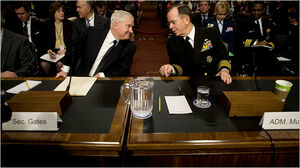Out of the dark
March 4, 2010, 10:59 p.m. | By
Rose Wynn
| 15 years, 4 months ago
Repealing "Don't Ask, Don't Tell" offers promise for gays
For 16 years, they've served in silence. They've risked their lives for those who didn't believe in them, for states that denied their right to love and for a country that forced them to conceal their true identity. They've watched commanding officers grimly dismiss their qualified brothers and sisters from service because of who they are.
Not only does a repeal of "Don't Ask, Don't Tell" offer gay and lesbian service members the right to expose their identity, but it also saves them from psychological trauma. According to the New York Times, one soldier who had served on both Afghani and Iraqi soil identified "cover-ups of the truth and a forced level of disingenuousness in the name of unit cohesion" as factors that contributed to the policy's detrimental effect on gay soldiers.
Ironically, many supporters of the law argue it preserves unit cohesion. John M. Shalikashvili, Joint Chiefs of Staff chairman from 1993 - 1997, initially supported the belief that "homosexuality is incompatible with [military] service" and that lower troop confidence and less enlisting would result from openly gay service members. But a recent Zogby International poll found that 24 nations worldwide allow gays to serve openly in the military and none have reported issues with recruitment or morale.
Still, politicians claim that openly gay service members would make living circumstances uncomfortable and soldiers ill at ease. On the contrary, a recent study by RAND's (a name derived from the contraction of "research and development") National Defense Research Institute found that open homosexuality in the military has no harmful effect. The study, "Sexual Orientation and U.S. Military Personnel Policy," concluded gays and lesbians in the military remained generally cautious about revealing their identity to other service members and did not call special attention to themselves in ways that would diminish troop cohesion or effectiveness. Of the seven countries investigated, "none reported any impairment in military performance resulting from the presence of homosexuals."
In addition to nationwide support, repealing "Don't Ask, Don't Tell" has practical advantages in a time of military need. Admitting open homosexuals increases the number of eligible people who can serve overseas. More than 13,000 gay and lesbian service personnel have been dismissed in the 16-year lifespan of "Don't Ask, Don't Tell," according to the Servicemembers Legal Defense Network. Six hundred forty four homosexuals have been removed just since Obama took office, according to the New York Times. Even Shalikashvili admits, "Our military has been stretched thin by our deployments in the Middle East, and we must welcome the service of any American who is willing and able to do the job."
Despite the benefits of repeal, some political figures are battling with the potential political repercussions of such controversy. Congress' current agenda includes pressing initiatives with needed bipartisan support, such as finding a better strategy in Iraq; it cannot risk political cleavage with a rushed decision on "Don't Ask, Don't Tell." Internal strife has already delayed negotiations, as the Pentagon is debating whether to postpone repeal until 2011, when the U.S. is no longer fighting in both Iraq and Afghanistan.
But why wait and make excuses? Why deny able-bodied service members a right to serve at a time when we need them the most?
In his State of the Union address, Obama promised "to finally repeal the law that denies gay Americans the right to serve the country they love because of who they are." But this is not the time for vague political rhetoric. Congress should not delay the repeal of "Don't Ask, Don't Tell" by spluttering excuses and procrastinating. Gays and lesbians may not have the same sexual identity as their fellow service members, but they share everything that matters: honor, excellence, a will to defend the country, a desire to uphold patriotic values and a readiness to sacrifice themselves for America.
Rose Wynn. I love piña coladas, getting caught in the rain and the ladies of the Blair Pom Squad. More »
Comments
No comments.
Please ensure that all comments are mature and responsible; they will go through moderation.


